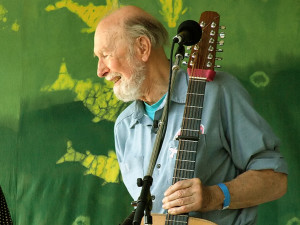 Pete Seeger, the folk music legend who kept years of American music in the public consciousness while having a profound influence on thousands of artists who followed him, died last night in New York City. He was 94 years old.
Pete Seeger, the folk music legend who kept years of American music in the public consciousness while having a profound influence on thousands of artists who followed him, died last night in New York City. He was 94 years old.
Seeger was born into a musical family; his father taught ethnomusicology at Yale and Julliard. Early in his life, Seeger seemed destined for a life in academia, but after dropping out of Harvard in the 1930s, Seeger’s path diverted drastically. He took a job working with musicologist Alan Lomax, who was working to chronicle and preserve traditional American folk tunes. It was while working with Lomax that Seeger first met Woody Guthrie: the two played together in the politically-charged folk group the Almanac Singers, and they remained firm friends until Guthrie’s passing.
In 1948, Seeger co-founded the Weavers with Ronnie Gilbert, Lee Hays, and Fred Hellerman. Their besuitted, cleaned-up image helped make the Weavers a mainstream success, and the group succeeded in turning traditional folk songs from America and around the world into pop hits. Their career took a sharp turn, however, when the group was blacklisted during the McCarthy hearings. Seeger himself was almost jailed for contempt during the McCarthy hearings when he refused to answer questions about his political beliefs, but the charges were overturned.
Politics remained a key part of Seeger’s life throughout his songwriting career. His music touched on causes such as worker’s rights, anti-war sentiment, environmentalism, and economic disparity. Both his politics and his music had a profound influence on the burgeoning Greenwich Village folk scene in the 1960s. It could be argued that Bob Dylan wouldn’t have had a career without Seeger’s patronage, regardless of how Seeger disapproved of Dylan’s decision to plug in.
Seeger is survived by his three children and six grandchildren.







Be the first to comment!